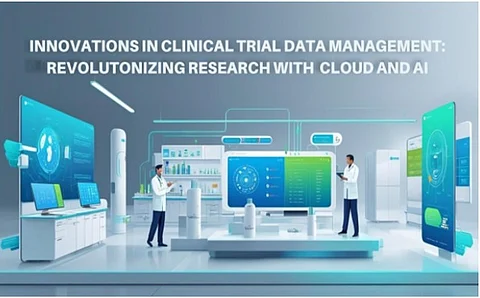

Clinical trials, which are the backbone of medical research, have become increasingly complex, generating massive amounts of data from diverse sources. In a world where time is critical and accuracy is paramount, technological innovations are stepping in to streamline the data management process. These advancements, particularly in cloud computing and artificial intelligence (AI), are revolutionizing the clinical trial landscape, providing solutions to longstanding challenges in data processing, regulatory compliance, and patient management. This article explores these innovations as discussed by Rishi Nareshbhai Lad in his research, highlighting how these technologies are reshaping the clinical trials of tomorrow.
Traditional clinical trials face increasing challenges due to the exponential growth of data from sources like electronic health records, wearables, and imaging systems. Manual data entry and siloed systems are no longer efficient or cost-effective, with data-related activities accounting for nearly a third of trial budgets. Errors from manual data entry contribute to costly delays. As data volume and complexity rise, maintaining data integrity and complying with regulatory requirements have become more difficult, underscoring the need for more efficient systems.
Cloud-based platforms are revolutionizing clinical trial data management by offering scalable and flexible infrastructure. They provide vast storage and enable real-time data synchronization across multiple research sites, ensuring that researchers have immediate access to crucial information. These platforms dynamically scale resources during peak data collection periods, essential for high-demand trials like those in oncology or neurology.
They also incorporate robust security features, including encryption and role-based access, ensuring compliance with regulatory standards and safeguarding sensitive patient data. By streamlining tasks like system validation and regulatory updates, cloud solutions reduce operational costs and facilitate adherence to CFR 21 Part 11 and GxP regulations.
AI is revolutionizing clinical trials, particularly in patient recruitment. By analyzing electronic health record data, AI quickly identifies eligible candidates, improving speed and accuracy compared to traditional methods. It also boosts retention by predicting patient dropouts, allowing researchers to intervene early. AI-powered predictive models enhance site selection, identifying top-performing research sites to increase recruitment rates and reduce screening failures.
Furthermore, AI enhances data quality by detecting anomalies and discrepancies early, ensuring trial integrity and accelerating data validation. This proactive approach improves both efficiency and accuracy in clinical trial processes.
Cloud-based platforms enable real-time data integration from multiple research sites in global clinical trials, providing central teams with up-to-the-minute updates on trial progress. This instant data access facilitates quicker decision-making and more agile trial management. Researchers can remotely monitor key data points, eliminating the need for frequent on-site visits and thus reducing monitoring costs.
Additionally, the cloud offers a unified view of trial data, allowing researchers to spot potential issues early and take corrective action before they become major problems. Overall, this enhances efficiency, reduces costs, and improves trial oversight.
AI-driven predictive analytics are enhancing clinical trial design and resource allocation by forecasting potential issues like safety risks and protocol violations. By analyzing early data patterns, AI can predict adverse events, allowing trial managers to adjust strategies and mitigate risks. Predictive models also optimize resource distribution by evaluating site performance, trial progress, and patient demographics, ensuring resources are focused where most needed. This proactive approach improves trial outcomes, reduces delays, and lowers costs, making clinical trials more efficient and effective. Predictive analytics is transforming the way trials are managed, ensuring smoother, faster processes.
The infusion of cloud-based platforms and AI can be seen transforming trial paradigms-one that offers substantial resolution to the ills and constraints identified under traditional run-of-the-mill methods. When conducting trials more efficiently, technologies now automate away within the routine parameter as they realize comprehensive cost-effectiveness. Researchers, with their commitment to keeping their work aligned with massive flaws in traditional trial processes, are required to adhere to strict regulatory standards.
Provoke me with yet another example in a further predicted argument that cloud-based systems will change the trials realm: "Integration of AI and Cloud-based systems might touch upon the very essence of human nature in clinical fields". With all these advancements within a year or a few, some other significant steps are in store for further synchronization of clinical trial processes with improvements in drug discovery.
Taken together, many digital experts believe that AI-empowered data analytics and cloud-based slots are forging an entire new class in clinical trial data reform. There is the greater potential over these technologies to accelerate clinical trials that are more precise, robustly dependable, and expeditious in delivering life-saving medicines to patients, as demonstrated by the groundbreaking work of Rishi Nareshbhai Lad.
